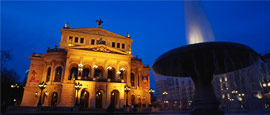Travel to Frankfurt
Flying to Frankfurt
Frankfurt International Airport is Germany's major air travel hub. British Airways and Lufthansa operate direct flights from the UK. Delta, Lufthansa, Singapore Airlines and United offer direct services from the USA and Air Canada from Canada. Ryanair flies from the UK to Frankfurt-Hahn Airport, though this is around 125km (78 miles) from the city itself.
Due to Frankfurt's popularity as a business destination, prices are more or less consistent year-round, but increased demand over major holidays such as Christmas and Easter can influence fares if tickets aren't bought in advance.
From London - 1 hour 30 minutes; New York - 7 hours 40 minutes; Los Angeles - 11 hours; Toronto - 7 hours 30 minutes; Sydney - 24 hours (including stopover).
Website:https://www.frankfurt-airport.com/en.html
Location:
Frankfurt Airport is located 16km (10 miles) southwest of Alte Oper, a notable city landmark.
Money:
ATMs are widely available in both terminals at Frankfurt Airport, including in every hall of Terminal 1 and Areas A, B, C, and Z of Terminal 2.
Deutsche Bank, Reisebank, and Travelex are also at various locations within the airport.
Luggage:
Baggage carts are available for €1, with payment options including Visa, VPay, MasterCard, Maestro, American Express, and Girocard.
Baggage storage facilities are in Terminal 1 (Area B, Arrivals), Terminal 1 (Area B-C, Departures), and Terminal 2 (Area D, Arrivals).
For lost items within Frankfurt Airport, go to the Lost & Found counter on Level 0, Concourse A, Terminal 1. Operation hours are 0700-1800 daily.
For lost baggage or items left on a plane, contact the respective airline for assistance.
Travel by road
Germany has an excellent network of roads and motorways. Generally, there are no speed limits on much of the motorway network, but individually marked speed limits appear on a large percentage of motorway miles. A maximum of 130kph (81mph) is recommended.
On normal roads, speed limits are 100kph (62mph) outside built-up areas, and 50kph (31mph) or 30kph (19mph) in built-up areas. Traffic drives on the right. The minimum age for driving is 18 years. Foreign drivers require their national driving licence and proof of insurance – third-party insurance is mandatory, but a Green Card is strongly recommended. A country identification sticker or national licence plate must be displayed on the vehicle.
Mitfahrzentrale are 'car sharing' agencies that link drivers with travellers heading to the same destination. Search the Mitfahrgelegenheit website (www.mitfahrgelegenheit.de) for possible car-pooling opportunities.
Frankfurt has an Umweltzone, a Low Emission Zone, which covers the area enclosed by the orbital motorway. Only vehicles displaying the green badge on their windscreen can travel within this zone. You can obtain badges from recognised test centres, garages and the vehicle registration authorities.
General information on travelling by car in Germany is available from the Allgemeine Deutsche Automobil Club - ADAC (tel: 0800 510 1112, in Germany only; www.adac.de)
ADAC (tel: 0180 222 2222, in Germany).
The Frankfurter Kreuz (near the airport, to the south of the city) is the most important junction in the German Autobahn network, where the A5 and A3 motorways connect. The A5 is the motorway to Frankfurt from the north (Hanover and Berlin) and the south (Karlsruhe and from across the border in Basel). The A3 connects Frankfurt with the east (Nürnberg) and west (Düsseldorf and Cologne).
From Munich - 3 hours 40 minutes; Hanover - 3 hours 20 minutes; Berlin - 5 hours.
Eurolines (tel: +49 6196 207 8501; www.eurolines.de), Flixbus (www.flixbus.de), IC-Bus (www.bahn.de/p/view/angebot/fernbus/) operate international services between Frankfurt and numerous destinations such as London, Paris, Rome, Moscow, Copenhagen and Budapest.
Eurolines, Flixbus and IC-Bus also operate services within Germany, including destinations on the 'Romantic Road' route. From Frankfurt, coaches go to Munich, Würzburg, Augsburg and Schwangau. All buses depart from the Frankfurt Hauptbahnhof Omnibusbahnhof, at the main railway station.
Travel by rail
The rail network in Germany is modern, extensive and highly efficient. The high-speed TGV/ICE connection links Frankfurt with Paris Gare de l'Est in less than four hours, while other IC and EC services link to destinations throughout Germany and abroad.
ICE trains serve a number of cities including Basel, Bonn, Dresden, Düsseldorf, Hanover, Munich, Hamburg and Berlin. The ICE Cologne-Frankfurt link is the fastest on the network, at just 64 minutes (50 minutes to Frankfurt Flughafen).
There are also night trains (www.oebb.at/de/angebote-ermaessigungen/nightjet) from Frankfurt to Vienna.
IR, IRE, RE (Regional Express) RB (Regional Bahn) and S-Bahn trains serve regional and domestic city destinations.
Frankfurt Airport also has its own train station, with regular ICE services to Amsterdam, Basel, Cologne, Hanover, Brussels, Paris, Stuttgart, Copenhagen and Munich.
Frankfurt’s Hauptbahnhof (main railway station), Am Hauptbahnhof Strasse, is the busiest in Germany.
Deutsche Bahn - DB (tel: 0180 699 6633, in Germany only; www.bahn.de) is the national railway provider.
Eurostar (tel: 03432 186 186, in the UK only or +44 1233 617 575; www.eurostar.com) runs from London to Brussels Midi in 2 hours. From Brussels, there is a direct ICE train to Frankfurt.
From London - 5 hours 30 minutes; Berlin - 4 hours 10 minutes; Cologne - 1 hour 5 minutes; Munich - 3 hours 10 minutes; Hamburg - 3 hours 40 minutes.
Do you have any Feedback about this page?
© 2026 Columbus Travel Media Ltd. All rights reserved. No part of this site may be reproduced without our written permission, click here for information on Columbus Content Solutions.








 You know where
You know where